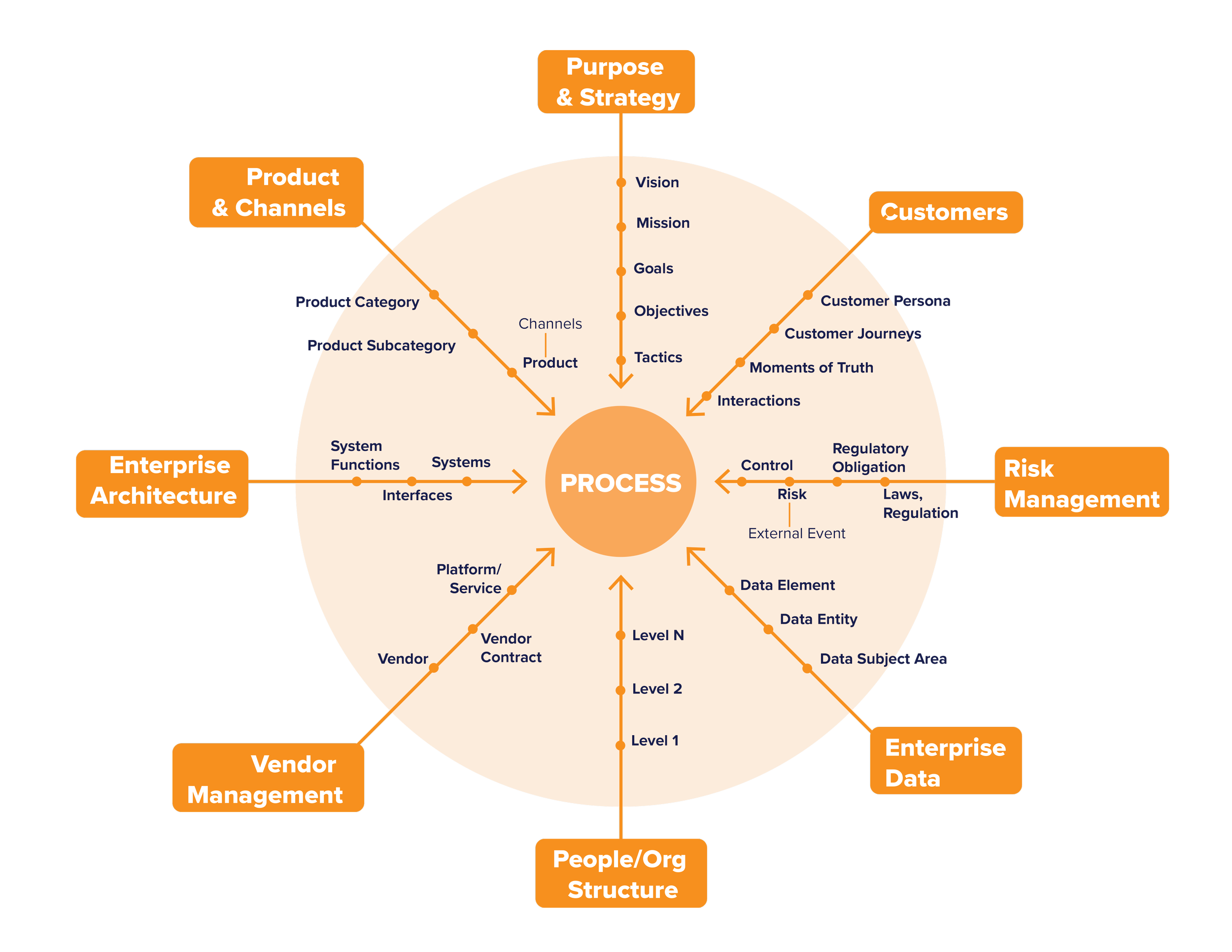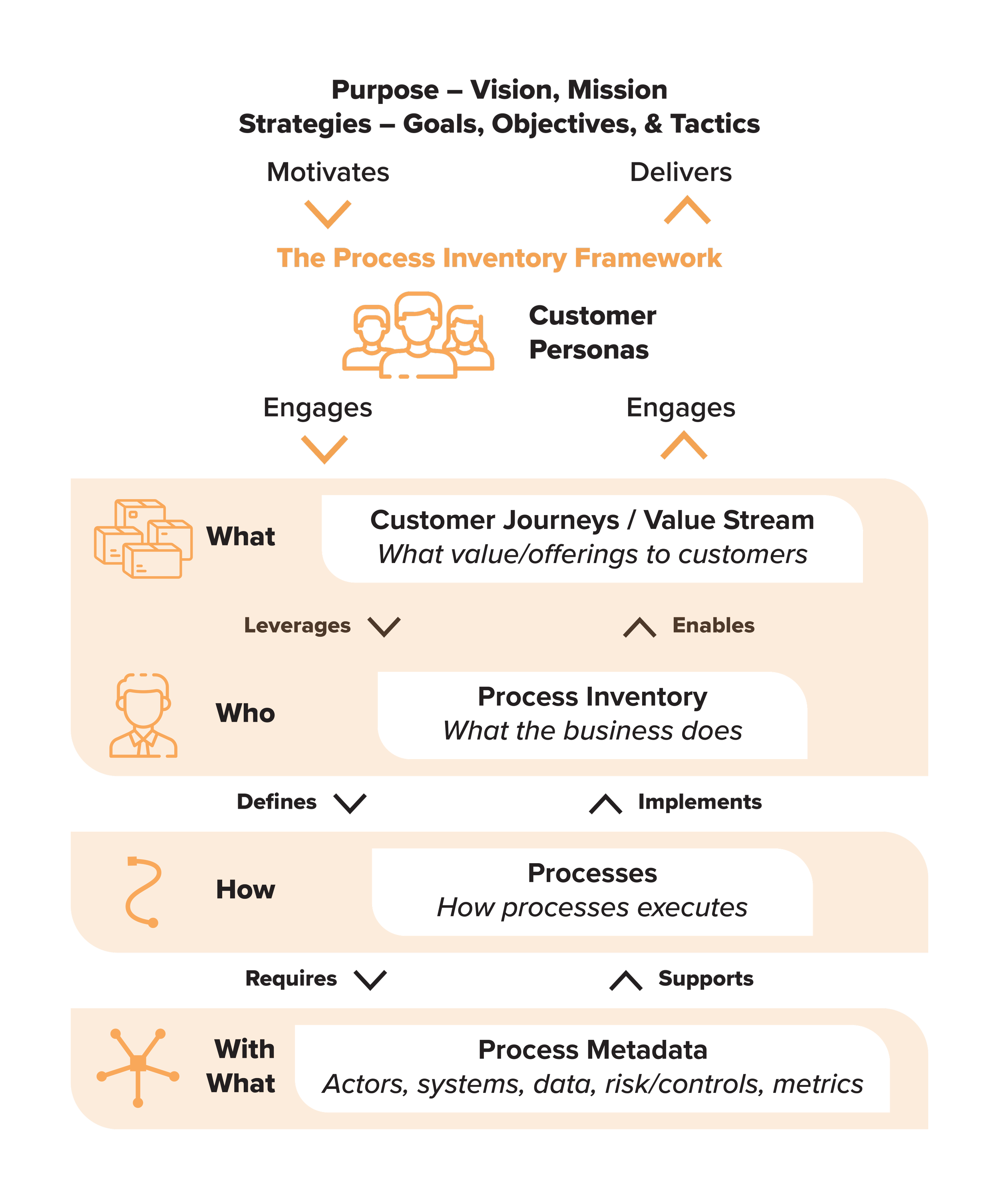
Transformational Strategies and Services
Process Inventory Framework Services
-
We can help you gain clarity on your transformation goal and metrics by aligning your strategy statements to the process areas that are impacted by them.
-
We help design your Transformation Management office operating model and routine so that it maximizes the clarity of the single language of process to effectively manage the transformation journey through to successful delivery.
-
Through our proprietary Process Center of Excellence playbook we can help you customize your COE to your objectives and define a complete model which covers frameworks & standards, operating model, tooling, value case definition, change management, planning, and more.
-
We can deploy teams that will model your environment. The models include: Process Inventory, Process Models, Customer Journeys, Value Streams, and more
-
We provide training to your teams across a wide range of personas such as Transformation Leaders, Process Modelers, Process COE leaders, and across all value cases which will enable your organization achieve success through successful adoption of this framework.
-
To achieve success your organization will have to change their ways of working to leverage this common language and these models. We help you design the future state use cases in your organization context and help you with the change management to implement with success.
One Framework for All Transformation Efforts
Transformation Benefits
-
Many efforts fail when attempting to translate high-level strategic imperatives into actionable ground-level execution. This approach facilitates mapping to each impacted process, allowing for precise determination of changes and their impact.
-
Transformations are typically multi-year, multi-project journeys with complex dependencies and overlaps. The adoption of a Process Inventory approach facilitates the management of this journey through a consistent business-oriented lens, thereby enhancing the effectiveness of transformation management and the delivery of business value.
-
Driving change is inherently complex, necessitating coordination across diverse functional teams. This complexity often results in budget overruns, missed timelines, and unmet business expectations.
Defining the project scope and anchoring all change deliverables to a common language of process facilitate clarity of impact and accountability. This, in turn, enables the delivery of business needs with reduced waste.
-
Technology and other external forces are rapidly shaping the business landscape. To stay competitive, organizations must embrace agility to swiftly adapt to these changes, which involves eliminating inefficiencies and waste through an Operational Excellence Program.
The Process Inventory Framework plays a crucial role in this endeavor by consolidating all operational intelligence into a single repository. This enables effective analysis and empowers leadership to prioritize efficiency projects in the most impactful areas.
-
Effective risk management is paramount across various industries, particularly in heavily regulated sectors. However, numerous challenges persist. A survey revealed that 74% of respondents struggle with maintaining non financial risk data, while another study found that 50% face difficulties in defining roles and responsibilities within risk management programs.
The Process Inventory approach can effectively tackle these challenges by offering precise business
-
In the digital era, the majority of organizational processes rely on technology for execution. A well-architected enterprise, closely aligned with business needs, can confer a competitive advantage. However, many organizations grapple with a complex and fragmented IT landscape—marked by redundant systems, poor interoperability, high costs, and prolonged change lead times. By harmonizing Enterprise IT designs with the Process Inventory framework, organizations cultivate an agile environment, enhancing efficiency in meeting business requirements.
The Connective Tissue for Transformation
A paradigm shift in Process Management is needed.
Current thinking in process management is way too limited! The sole focus is on optimizing processes through disciplines like Lean Six Sigma and process mining to gain operational efficiency.
This misses the broader 30,000-foot view needed to drive actual enterprise value.
The process is the key to unlocking organizational knowledge. It provides a common language to align diverse perspectives and connects the dots, enabling a clear understanding of impacts and root causes.
This new and holistic method is the antidote to transformation failures and is the key to your organization succeeding in the digital age!
One Unified Model of Your Organization
It's all about getting your team on the same page, speaking the same language, and moving towards the same goals.
Our approach covers all the bases - from sketching out your strategy to managing change, driving operational excellence, adopting agile principles at scale, and even navigating through the tricky waters of risk management.





